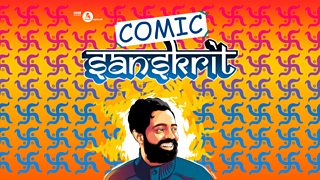Meet Raul Kohli, the comedian behind Asian Network's new podcast Comic Sanskrit

Raul Kohli adventures into his Hindu background to answer some big questions for Asian Network's new six-part Comic Sanskrit podcast, and for the first time he talks about what inspired his deep dive into Hinduism.
"I was raised a Hindu. My father is a Hindu and my mother is a Sikh. They took me to the temple as a child, we celebrated Diwali and they made sure I didn’t eat beef. That was the extent of my Hindu upbringing. Reciting the story of Ram & Sita, the odd donation and never being allowed the tastiest option at Toby Carvery.
I hated the temple, and if I’m honest I hated the religion for the same reason every kid hates their temple and their religion - it was a boring ritual forced upon me which I did not understand.
As I got older, I became interested in studying a bit more because I’d heard titbits through the grapevine that I’d found interesting: Krishna was a Lothario during his time on earth, Hinduism was one of the only religions with both female and transgender deities and apparently Shiva liked smoking a spliff or two when he passed through our world. A feminist LGBTQI+ drug friendly religion isn’t really something you hear about in an R.E. class, nor was it how mam or dad presented it at the dinner table. My Hindu ‘priest’ might have been saying all this in temple but he delivered his sermons in Sanskrit so I was non-the-wiser.
So, for the past few years I’ve been trying to brush up my knowledge of Hinduism. My search to find the equivalent of the Holy Bible for Hindus led to the Bhagavad Gita. The Bhagavad Gita is an 800+ page book that contains teachings about morality and the nature of the Universe. It was a speech given by Krishna within the Mahabharat, which is a story about a war between two families that spans over 200,000 individual verses. The story of the war is of equal importance as the Bhagavad Gita itself to Hindus so I guess I’ll have to read the Mahabharat too. In it, Vishnu, the supreme personality of God within Hinduism comes to Earth in his 12th incarnation as Krishna. In his 11th incarnation, he came as the aforementioned Ram - in the story of the Ramayan, which again aforementioned is the story behind Diwali. The Ramayan is 24,000 verses and given it’s the only book of the three I remember being taught as a child, I’ll have to read that too. But the Ramayan is dated to the 5th Century BC. Hinduism itself is an older than that so what were Hindus reading before the Ramayan? Well there’s the Vedas which is longer than both the Ramayan and the Mahabharat. There’s also the Upanishads, the Brahma Sutras and a book called the Kama Sutra which was written by a Hindu monk.
Hinduism, like the British constitution, has no fixed place or one scripture. It spans hundreds of books, hundreds of Gods, 6000 years and 1 billion people. And everyone’s definition of even just the word Hindu is different. So I decided to make a podcast about what Hinduism actually is. I talked to a pandit (A Hindu priest, not Chris Kamara), a yoga teacher, some comedians, some campaigners and even a surprise Sikh.
Each episode focusses on a particular subject: mental health, yoga and meditation, sex and relationships, marijuana, gender roles, eating meat and finally faith and atheism. In these six episodes, we try to summarise everything there is about Hinduism… but we fail. However, we do summarise everything we learnt about Hinduism. It’s safe to say, I learnt things I was not expecting on this project. Through Stand-up, sketch and interviews, we try to break Hinduism and these subjects down. Some of it is enlightening, some of is beyond stupid but all of it is hilarious – if I do say so myself.
We launched Comic Sanskrit on 11th December - Election day. So now the dust has settled, whether you’re commiserating or celebrating, put your concerns for the country to the back of your mind, and come and enhance your understanding of your existence. Or you know, just listen and subscribe to my podcast."
You can download Comic Sanskrit here and find out five things Hinduism did first below.

